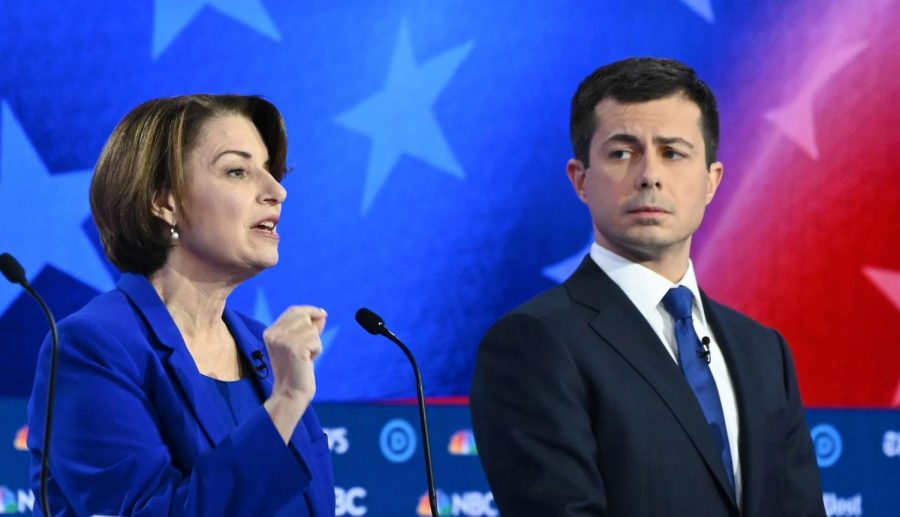The real reason they dropped
Senator Amy Klobuchar beside Mayor Pete Buttigieg. Both dropped out of the presidential race just days before Super Tuesday.
After placing first in Iowa, second in New Hampshire, third in Nevada, and fourth in South Carolina, it seemed that Mayor Pete Buttigieg was losing momentum in the Democratic presidential primary race.
When he dropped out Sunday, March 1, his collapse was confirmed. However, the reason why Buttigieg actually dropped out may have very little to do with his faltering success.
Just one day after he announced his exit, Buttigieg endorsed former Vice President Joe Biden in his bid for the presidential office.
Although this may seem insignificant, Senator Amy Klobuchar followed suit, dropping out of the race Monday and endorsing Biden just a few hours later.
Two strong candidates, two drop outs, two days. What compelled these two to suspend their campaigns just days before Super Tuesday?
It all boils down to one common problem for these democrats; Sanders for president.
Senator Bernie Sanders began the Democratic Party’s nomination process as a front-runner, and capitalized on this more and more as his campaign went on. Virtually tying for first in Iowa, winning New Hampshire, and again taking Nevada, moderates began to worry about the future of their party’s nomination.
Labeled as too old, unrealistic, a communist, a socialist, and an extreme leftist by republicans and even some democrats, the presidential candidates could not have made their dislike for Sanders clearer than in the Nevada debate on February 26.
Mayor Pete Buttigieg challenged that congressional democrats are “running away from [Bernie’s] platform as fast as they can.” Senator Klobuchar described his policies as “a bunch of broken promises that sound good on bumper stickers.”
Senator Warren attacked him by mentioning that his plan “doesn’t explain how to get there, doesn’t show how we’re going to get enough allies into it, and doesn’t show enough about how we’re going to pay for it.” Mayor Bloomberg summed up the opposition by asking “Can anybody in this room imagine moderate Republicans going over and voting for him?”
Needless to say, Senator Sanders came under major fire.
“I’m hearing my name mentioned a little bit tonight,” the Vermont senator responded less than 15 minutes into the debate. “I wonder why.”
This debate became a major turning point for the moderate members of the democratic presidential field. It became less about them winning, and more about Sanders losing.
“Can anybody in this room imagine moderate Republicans going over and voting for [Bernie Sanders]?” -Mike Bloomberg
Then came South Carolina. Joe Biden was expected to win big – and he did. He won 72% of the delegates available, and rose near the top of the democratic field, just barely behind Sanders.
This was just three days before Super Tuesday. But in this time frame, Pete Buttigieg, with 26 delegates, and Amy Klobuchar, with 7, both dropped out. And Klobuchar’s home state of Minnesota was set to vote for Super Tuesday.
Senator Elizabeth Warren had only 1 more delegate than Amy Klobuchar. She had not won a single delegate since Iowa. And her home state of Massachusetts was also set to vote on Super Tuesday. Yet she did not drop out.
Buttigieg and Klobuchar’s exit, however, had almost nothing to do with their results in South Carolina or otherwise. It had everything to do with Joe Biden.
The moderate democrats needed someone to rally behind. The central field was split between Biden, Buttigieg, and Klobuchar. Before South Carolina, Biden had 11 fewer delegates than Buttgieg, and only 8 more than Klobuchar. Together, they shared 48 delegates.
Meanwhile, Sanders had accumulated 45. And the other far-left candidate, Warren, had only received 8.
With Biden’s newest surge in the South Carolina primary, the moderates now had their desperately needed front-runner. They now had to stop splitting the votes among themselves. Buttegieg dropped and endorsed Biden before Super Tuesday, and so did Klobuchar.
However, Buttigieg and Klobuchar are few of the dropped candidates to endorse another. Entrepreneur Andrew Yang has not yet endorsed anyone. Senator Kamala Harris has not yet endorsed anyone. Philanthropist Tom Steyer has not yet endorsed anyone. And Senator Elizabeth Warren has not yet endorsed anyone.
Thus, the endorsements for a presidential candidate at this point are an anomaly. Especially so soon after their own step back.
Mayor Buttigieg and Senator Klobuchar did not drop because of their own shortcomings. They stepped back to oppose Sanders by pooling all their support behind Joe Biden.












